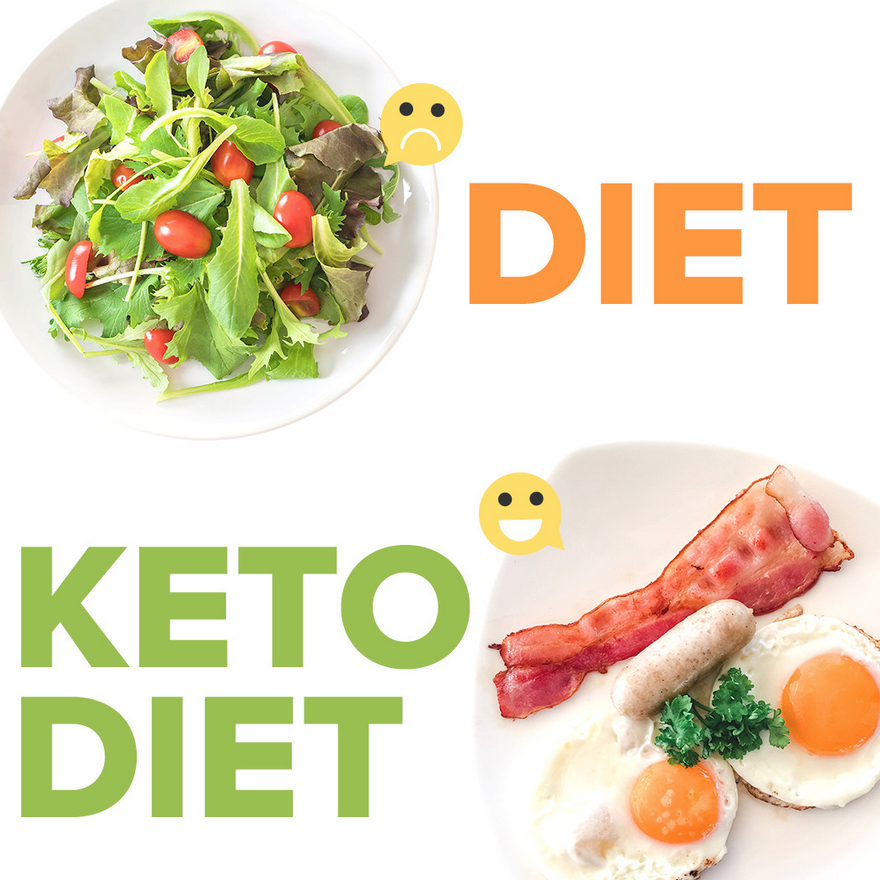A keto diet, aka a ketogenic diet, is a diet which enables the body to:
- transition from burning carbohydrates to using fat as fuel and
- maintain the use of fat for fuel instead of carbohydrates
The body produces two substances when carbohydrate intake is high:
Glucose: Glucose is the easiest molecule for the body to convert to energy. This is why carbohydrate intake will negate the body’s ability to enter ketosis.
If carbohydrate intake is high, the body defaults to converting carbohydrates into glucose to use for energy.
Insulin: Insulin aids in the transport of glucose around the body. When you reduce your carbohydrate intake and replace it with fat, your body will transition into and maintain the metabolic state called ketosis.
Ketosis is defined as the process by which your body breaks down fatty acids to produce ketones in the liver, which can supply both the brain and body with energy.
Ketones come in three forms:
- Acetoacetate (AcAc)
- Beta-hydroxybutyric acid (BHB)
- Acetone
Simply put: If you want to getting into and stay in ketosis, Carbohydrates consumptions must be greatly reduced or completely avoided.
It is recommended to keep your carbohydrate consumption to 5% or less of total calories.
Generally, this means you want to consume less than 30 grams of net carbohydrates per day.
Net Carbohydrates = Total Carbohydrates minus Fiber
You also need to understand and monitor your protein intake.
Protein is not the enemy, as with carbohydrates and your protein intake will make up a significant part of your diet.
Protein provides plenty of essential functions that are extremely valuable to your body’s function in ketosis.
However, keep protein consumption to only 25% of your total calorie intake.
In ketosis, fat is king, so the rest of your calories must come from fat.
This is the new macro-nutrient source that your body will transform into energy in the absence of carbohydrates.
The Different Types of Keto Diets
When it comes to the keto diet, there are several types, and they include:
Standard Keto Diet (SKD)
The Standard Keto Diet (SKD) is a keto diet plan recommended to individuals new to keto diets to follow when they are first starting out.
This diet follows the general guidelines of keto including low-carbohydrates (5%), moderate protein (25%) and high-fat (70%) intake.
Cyclical Keto Diet (CKD)
The Cyclical Keto Diet (CKD) is more suited for athletes and active individuals who want to use carbohydrates to fuel their intense training sessions.
This diet involves a period of higher-carbohydrate refeeds during the week.
An example would be 5 days following the SKD and then 2 days eating high-carbs intake, anywhere from 400 to 600 grams.
Targeted Keto Diet (TKD)
The Targeted Keto Diet (TKD) is also meant for more active individuals who struggle with energy during their workouts, but their need is less intense compared with those individuals using the CKD.
The TKD follows the SKD with the addition of 25-50 grams of net carbs around your workout times, about 30 minutes pre and post-workout.
High-Protein Keto Diet
This ketogenic diet is very similar to the SKD, with the addition of higher protein intake.
SKD recommends 25% protein intake and the high-protein ketogenic diet often includes up to 35% of total calorie intake from protein.
Health Benefits of the Keto Diet
When it comes to the health benefits you can gain from the keto diet, the list is extensive with the most popular being wight loss.
The ketogenic diet can not only help you lose weight, but research shows that the keto diet is superior to the often-recommended low-fat diet for weight loss.
Some top health benefits of the ketogenic diet include:
1. Improves Weight Loss
Overweight and obese individuals have had tremendous success losing weight following the keto diet.
One study, in particular, found people on a keto diet lose 2.2 times the amount of weight than those on a calorie-restricted low-fat diet.
The keto diet is also known to turn your body into a fat-burning machine.
And what does this lead to? Weight loss!
2. Reduces Chronic Inflammation
While inflammation is a natural biological response, chronic inflammation is a bad thing.
A keto diet can help reduce inflammation in the body by switching off a number of different inflammatory pathways active by high carbohydrate consumption.
3. Increases Energy Levels
When you switch to a keto diet, your body and brain switches to using ketones as fuel instead of glucose from carbohydrates.
Running on ketones, you experience fewer energy slumps when compared to using glucose derived from eating a diet high in carbohydrates.
Ketosis helps clear the brain of brain fog while creating more mitochondria which are cells that help the body generate energy and power.
If You Would Like A Little Help To Get Started And Stay On Track, Why Not Try The Custom Keto Diet?

